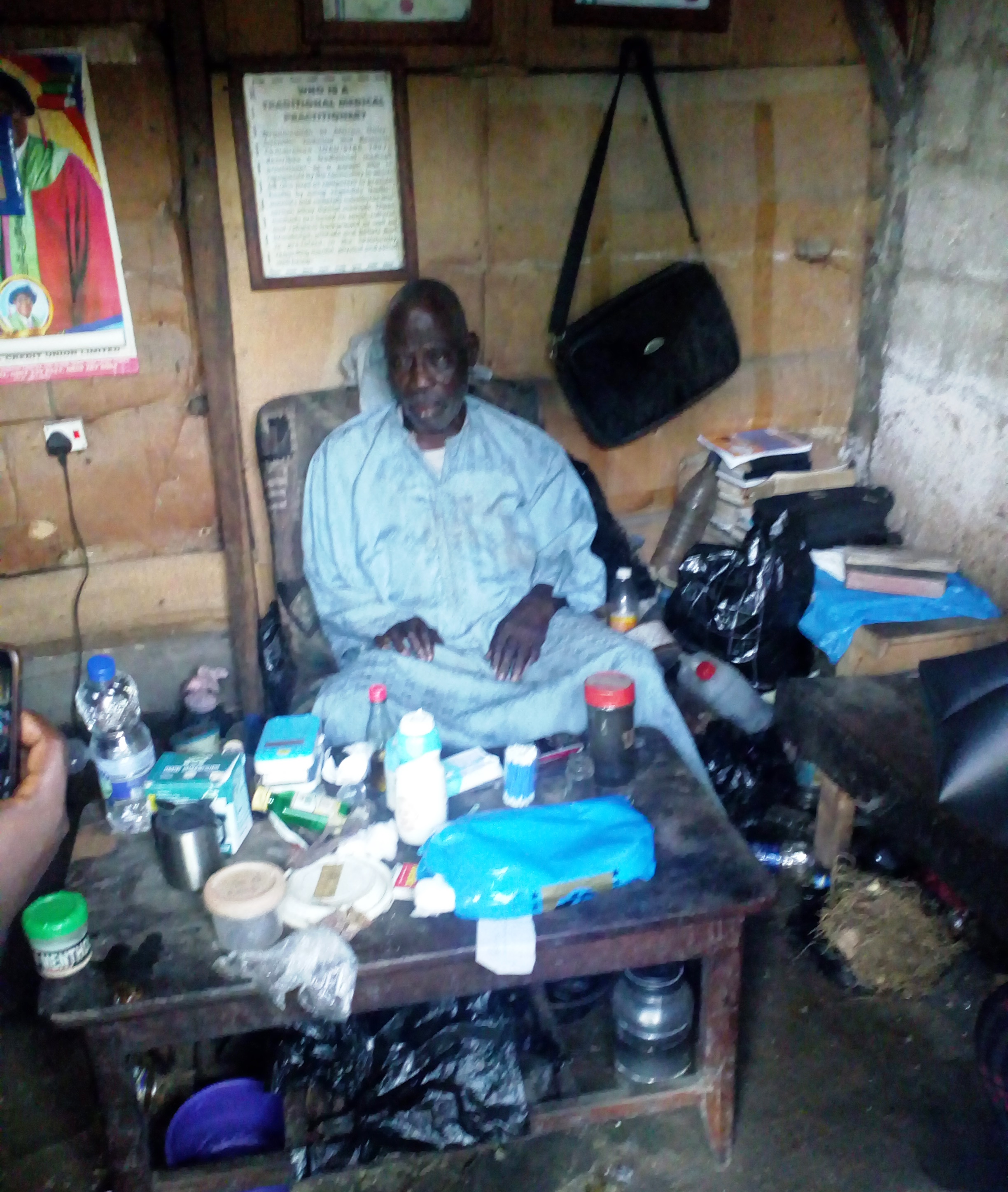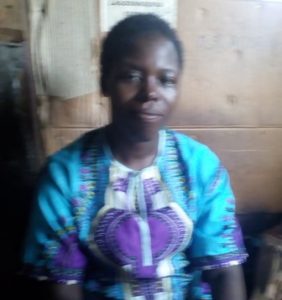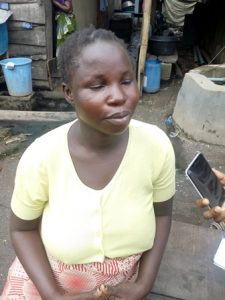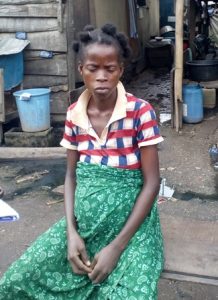Killers or saints: Examining TBA’s role in maternal health care (Part 1)
-
Women can’t just stop visiting them

Despite the availability of robust healthcare services in Lagos, preference for Traditional Birth Attendants (TBAs) remains high. TBA Homes continue to thrive despite the attendant risks those that patronize them often face. However, further investigations by Nigeria Health Online reveals that some women patronize TBA for lack of health facilities near them. In this special report, ace reporter JULIET UMEH examines the different perspectives of women that patronize the TBAs. She reports that more women still prefer to visit them instead of the PHCs where the required facilities, personnel and modern medication are available for the welfare of pregnant women and their newborns.
She gave birth just few hours before the arrival of the reporter. Twenty- year-old Fatima Balogun and her baby were already lying down on a mat covered with bed spread on the bare floor of the traditional birth attendant’s multipurpose room. The room serves as labour/delivery room, ward and office for Baba Elijah Paul, the traditional birth attendant (TBA) in charge of this popular maternity home at Sogunro Ago Ogu of Iwaya community, under Yaba Local Council Development Area, who successfully delivered Fatima of her healthy looking baby boy.
Fatima was all smiles as the reporter and one other visitor congratulated her. She was not bothered by either the dirty environment or the crowded one room “maternity home” where she had just delivered and now recuperating. Cheerfully, she also responded intermittently to greetings by passers bye walking across the plank that serves as a bridge and connecting road to the home, one of the rooms in an old bungalow separated from the community by a large pool of dirty water which can only be accessed thorough the tiny plank ‘bridge’, The “maternity home” is run by Elijah, fondly called Baba Eja, meaning ‘father of fish,’ a name he merited from the uncountable deliveries he had conducted in the community.
Fatima’s joy was palpable. This is not her first delivery. She lost her first child a year ago during delivery at another TBA centre. She recalled she was only lucky to have been alive then. Now, she’s overjoyed that the baby has stayed this time around, thanks to Baba Eja’s rich experience.
“On that faithful day, (referring to her first delivery), it was God that saved me; I would have followed the child,” she narrated. “I’ve heard a lot about Baba Eja since then, so I started coming here for antenatal when I became pregnant again. Each time, Baba would give me some herbal mixtures to drink and some to bath with,”
Fatima was full of gratitude and admiration for Baba Eja. The delivery, she told the reporter, was not so smooth, just like her first experience. But Baba Eja’s experience made the difference
“The delivery this morning wasn’t so easy for Baba Eja. He had to be assisted by a nurse when he experienced some challenges. It was when the nurse gave me an injection that the labour pain began. Baba then instructed the nurse to place me on a drip after I took some herb. That was when I became so pressed and began to push” she said.
Fatima however blamed herself for the prolonged labour. She told NHO it would have been without much stress if she had followed Baba Eja’s instructions to placate the gods so as not to experience another difficult delivery like the first time.
“There were some things Baba asked me to do before now which I couldn’t do as a result of financial constraints. For instance, he asked that I bring some things to appease the gods and witches that attacked me during my first delivery and made me lose my child. But Baba was still able to prevent the witches this time around.”

Obviously Fatima will be seeing Baba Eja again for her future deliveries. A tour of the community in search of women like her who had used Baba Eja’s maternity home proved very easy as virtually all the young mothers in the neighbourhood had experienced his wonder touch. Not that they have much choice though. Baba Eja’s place was the only facility in the community offering antenatal care and child delivery.
Like Fatima, Charity Rowland, a caterer and also a resident of Sogunro Ago Ogu cannot think of anywhere else to go for her health care needs. She’s full of praises for Baba Eja’s healing prowess who she described as an excellent TBA. She started patronising him ten years ago during her first pregnancy and she has never looked back since then. Baba Eja is now her family doctor, also caring for her electrician husband and their children.
“Baba has different herbs for virtually all ailments. The agbo (herbal preparations) he gives us when we are ill always helps, especially when we feel weak or have malaria. He treats people with too much sugar in their body and whenever we take the herbs we are relieved. Baba also has power to fight witchcraft.” she told NHO,
Several other women in the community had only glowing words for Baba Eja. Mrs. Olorunwa David, wife of a fisherman, testified that she had her child, Biodun, now a year and half old, at Baba Eja’s place even when the child decided to be born before she was due.
“My child gave me a little problem because I delivered her in eight months. I fell down and it was as if the baby wanted to come out. Baba Eja confirmed it was actually coming out and that was it. No problem.”
For heavily pregnant Mrs. Agati, an indigene of Cotonou, she has been receiving antenatal care from Baba Eja’s home for over three years since there is no hospital nearby.
“I visit him regularly for check up and antenatal care. You may pay N3,500 for registration and as you continue, you pay N500 at each visit. Baba is doing an excellent job, she told the reporter.
Even while commending Baba Eja for his services, many still wish the government would remember them one day and establish a health centre in the community.
Mrs. Tawa Kazeem, a 28-year-old Badagry indigene told NHO the nearest hospital available to the community is in Iwaya, several kilometers away.
“Things may get out of hand before you find your way to Iwaya from here. The labour may start in the middle of the night, and if there’s no vehicle to rush the woman down … well we can only pray as there is no alternative. Sometimes, the baby and mother would have lost strength. If they are lucky, one of them may survive and such cases are very common,” she said, adding that this is why many women troup to Baba Eja.
Roland, Tawa and Agati
Baba Eja himself is aware he renders an invaluable service to the community. He told NHO he has been providing his services for 25 years, taking care of pregnant women and delivering babies right in his one-room “clinic” at affordable charges, even to the poorest of the poor, both day and night. His goal, he says is to save the lives of women and their children from dying because they have to travel a long distance for antenatal care and delivery,
“I stepped in to render assistance because each time the women have to go so far for their delivery, many end up losing their lives and children. They don’t pay much; most of them cannot pay more than N5, 000. After that they won’t come again until they are pregnant again. And I don’t bother to ask them for my balance because many of them will even fight.”
Baba Eja says he has never experienced much problem while attending to his patients. He even encourages the women to go for scan during ante-natal. Well, he wouldn’t divulge whether or not he understands the technicalities and language of the scan but he says it helps.
“As the result comes to me, I’ll examine if the baby is sitting properly and if not, I know what to buy that the baby will be positioned properly,” he explained.
On whether he is a registered TBA he mused: “I have collected several certificates. Before, I do attend TBA programmes but since they are not serious I just stay on my own,”
“I have one nurse that I call to assist because delivery is not something only one person will face. It is a job of saving lives. Sometimes, I hand over the N5, 000 I collect to the nurse because my focus is to save lives.”
NHO could however not verify whether the nurse is certified or just an auxilliary. But Baba Eja vouches for her efficiency and ability to help take difficult deliveries.
Not too far from Sogunro are two other communities, Makoko and Okuagor, inhabited by mainly fishermen and petty traders. With a population of about 500, 000, there is no modern health centre here and the people depend on TBAs, not only for maternal health care but other health care needs as well.
NHO investigations revealed that maternal and child mortality in these communities is quite high.
“Only this 2017, we have experienced up to 20 women dying from pregnancy-related issues. Out of these, not up to 10 of the children survived because the mothers had laboured for too long and had become very tired before the baby will come out,” the Baale of Sogunro Ago Ogu community, Chief Yusuf Kumayon, confirmed to NHO.
Not only does this communities lack health care facility, the only means of reaching the community is by a canoe which sometimes may not be available during emergencies.
“It is only God that will save our pregnant women because when a woman enters labour at night, it’s always hell because sometimes, the only canoe which serves as our only means of transport may not be there. So tell me, a woman who is in labour, how will she cross the river to the other side? On our own, we use planks to construct a bridge but immediately it rains the planks are washed away.
“On a normal day, our women go to the private hospital in Yaba, Adekunle and Gbagada area, none of these facilities is near here. The only PHC closer to us is in Iwaya. But we still have some traditional medicine practitioners and TBAs. We thank God because they are helping our women to survive,” Chief Kumayon said.

The Baale of Sogunro Ago Ogu.
While it appears the women in these communities have little or no choice but to rely on the TBAs for their health care needs since there’s no single health facility there, NHO investigations however reveal that a large number of women, even in the city, still prefer to have their children in the traditional or herbal maternity centres.
The reasons for such preferences range from age-long customs which they are not in a hurry to jettison, morbid fear of surgery to just their unshakable confidence in the TBAs.
Mrs Mary Ekeh belongs to this group. A resident of Ishaga area of Lagos, she told NHO that her people in Ogwashiuku in Delta State, where she hails from, consider the TBAs as the safest hands for child delivery and she is determined to continue the practice even in Lagos.
She recalled her experience in a hospital to prove that her belief in the custom of her people is not misplaced: According to her, She was once told at a government hospital that she could only deliver her second child safely through caesarian section.
“That was the last time I ever visited the hospital,” she told NHO, adding that she had to go to a TBA in Ikorodu where she had her baby, safely.
According to Ekeh, she was referred to the TBA by a friend who had a similar experience in one of the hospitals.
“My friend reminded me that women are not encouraged to give birth through CS back home. She recomnended an Ijaw TBA woman and I knew I wouldn’t have any problem after my first antenatal visit there.”
“It was not as if she gave me so much medicine, all she did was cook unripe plantain and fish with some herbs. She prepared everything in my presence. After the meal I would return home.
“I visited her place about five times. On my last visit, two weeks before my delivery, she told me to pound a collection of leaves, squeeze out the juice and drink. Immediately, I began to feel some sensation on my pelvis and that was the beginning of labour. At the end of it all, I had a successful delivery.” She noted that she paid the sum of N12, 000 for the services of the TBA, instead of over N200.000 she would have coughed out at the hospital for a CS.

A visit to another TBA centre in Badagry was a revelation. The home was a far cry from the situation at Baba Eja’s place. It was like a General hospital as women trouped in, in their numbers, for antenatal care.
One of them, Bukky Durosimi said:“I am here for my antenatal. I got married last year. It was my husband that asked me to come here. I did not register in any other hospital because this is the place my husband and my mother in-law want me to come. This is where my mother had her last born too.”
As for 28-year-old Bose Abiodun, the TBA Home is more of a safe haven. “It’s been long I started coming here. This is where I had my first baby and I like the treatment here. I was ill when I was about having the baby, and in the hospital they told me I would undergo surgery, but when I came here, I delivered the baby normally,” Abiodun said.
39-year-old Loretta Nzute on the other hand was at the herbal home for infertility treatment. She is confident the TBA is capable of rectifying her problem. Married for 10 years without a child, she believes she will soon joint the antenatal department, going by the experience of her friend, Ify, who went through similar treatment there and became a mother afterwards.
Most TBAs interviewed by NHO were however reluctant to talk about death of patients. While a few admitted very few deaths due to some complications ranging from witchcraft to poorly managed cases from the hospital, others swore no woman had ever died while in their care since they started their practice.
Some also told NHO they know their limit and do not hesitate to refer difficult cases to the hospitals. This, according to them, reduces the rate of death at their centres to almost zero. But is this the real situation?
Don’t miss part 11 of this story




